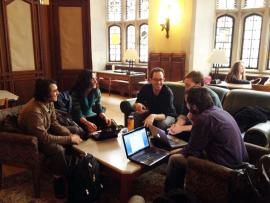What to Expect and The Benefits of Peer-Review Groups
What happens during weekly meetings?
At the first meeting, the group members decide the day and time of their weekly meetings and discuss the rules for the group.
They also set their schedule and agree on best practices for feedback. At each weekly meeting, two or three members present written work for detailed feedback.
The members of the group have reciprocal obligations – you give me feedback this week, and I will read your paper next week.
How can I benefit from these groups?
Being part of a Peer-Review Group will not only help you keep your writing progress on track, but also allows you to workshop ideas, improve your written communication, and receive constructive feedback from an interdisciplinary audience, something which you possibly do not receive from your advisor or committee.
Groups generally have only 5-7 members so that everyone receives individual attention. The diverse specialties of the group members foster innovative and creative thinking, and can initiate collaborative projects and research.
In addition, these groups provide you with emotional support, in contrast to an academic setting that can feel impersonal and anonymous. Group members become colleagues with whom you can vent and sympathize, as well as a source of encouragement and motivation.

